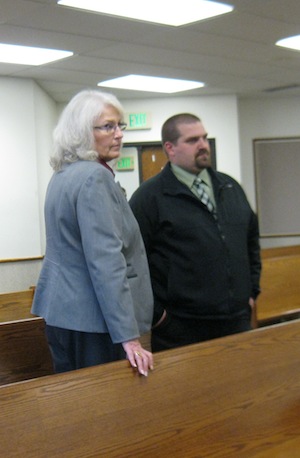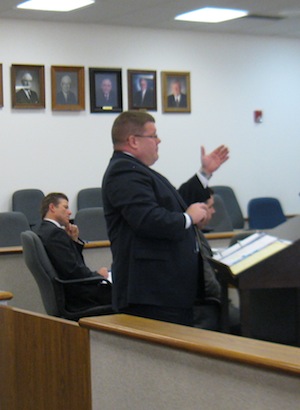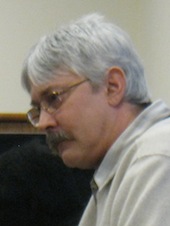
Sherry Tibbetts, the woman Riffe has been with for 24 years in Alaska, waits to make sure he sees her before leaving the courtroom this afternoon; with her son Jeremy Kern. Tibbetts was kept out of the courtroom until now because she was listed as a witness.
Updated at 8:21 p.m.
By Sharyn L. Decker
Lewis County Sirens news reporter
CHEHALIS – After arguments, motions and rulings this morning without the jury, murder defendant Ricky Riffe’s lawyer told the jury his client instructed him not to put on any defense witnesses.
Prosecutors rested their case just before 11 a.m., and Seattle-based attorney John Crowley stood up and announced to the courtroom:
“Mr. Riffe has directed the defense to call no witnesses and rest our case,” Crowley said. “On behalf of Rick Riffe, we rest our case.”
Then Crowley sat down.
The abrupt conclusion of the weeks-long witness testimony portion of the trial set the stage for closing arguments to begin tomorrow morning.
Riffe, 55, is charged in Lewis County Superior Court with numerous offenses in connection with the December 1985 shotgun deaths of Ed and Minnie Maurin, an elderly couple from Ethel. He and his now-deceased younger brother have been the prime suspects since the early 1990s but he was only arrested last year.
Based on conversation by the court about scheduling, Lewis County prosecutors will take several hours tomorrow for closing, summarizing what they think the evidence has shown.
Then the following morning, Crowley will offer his closing arguments. Prosecutors get the last word with counter arguments and then the jury can be sent to begin deliberations.
The jury was given a long break until after lunch.
Outside the presence of the jury this morning, the judge heard arguments on the previously filed defense motion for prosecutorial conduct, regarding the jailhouse snitch who denied on the witness stand he got anything in exchange for his testimony against Riffe.
The judge had harsh words for both Lewis County Senior Deputy Prosecutor Will Halstead and Crowley
Crowley argued it should lead to a mistrial or dismissal and to disqualify Halstead.
He told the judge the incident deprived his client of a fair trial and that also prosecutors had concealed from him there was a plea deal in place with Erwin Bartlett by not sharing the documentation during the discovery process.
“He was perjuring himself and the prosecutor knew he was perjuring himself at that point, and what the prosecutor didn’t know is we knew,” Crowley said.
Judge Richard Brosey said he could only dismiss if there was no other recourse, but that in the case of Bartlett, by the time the jury heard Crowley’s cross examination and Bartlett’s attorney was put on the stand to verify what occurred, it should have been very clear to the jury there was a deal.
The judge suggested the proper channel for the complaint was not through himself, but through the bar association.
On the matter of Crowley emailing prosecutors that he would not file the motion if they would stipulate to certain other matters, Brosey was equally blunt.
“It sure looks to me like that’s extortion Mr. Crowley,” Brosey said. “How do you explain that any other way?”
“All we were trying to do is get them to stipulate to the truth of the matter,” Crowley said.
Before the jury was brought back in, Crowley made a separate oral motion for dismissal of all charges, stating there hadn’t been enough evidence presented.
The judge denied the motion.
Riffe is charged with two counts each of first-degree murder, first-degree kidnapping and first-degree robbery, as well as one count of burglary; all either as the principal player or as an accomplice.
Numerous aggravating circumstances are alleged including particularly vulnerable victims and deliberate cruelty.
Prosecutors are leaving room for a variety of possible scenarios.
Halstead told the judge that since there were no eyewitnesses, and nobody knows exactly what occurred, it was possible the jury could conclude whoever drove the Maurins up Stearns Hill Road and shot them, whether it was Greg Riffe or Ricky Riffe, that the killing was not premeditated.
He asked for a jury instruction which would allow jurors to find Riffe guilty of second-degree murder instead of first-degree.
The judge said he would allow the so-called lesser included offense to be contemplated by the jury, noting it was unusual for the state to be proposing it, as such an instruction usually it would be sought by the defense and the state would oppose it.
Judge Brosey read to the jury the lengthy list of jury instructions.
The jury was also read a list of stipulations, facts agreed to by both sides to be placed in the record for jury consideration in lieu of live testimony.
The following are among them:
• Rick Riffe and Robin Giddings married in Reno, Nevada on Jan. 5, 1985
• They two divorced in 1991.
• Robin Riffe died of natural causes in 1994 in Washington state.
• Rick Riffe was convicted of a felony in 1981, and could not legally possess firearms until at least 1986.
Closing statements are expected to begin at 9:30 a.m. tomorrow.
The trial is open to the public. The courtroom is on the fourth floor of the Lewis County Law and Justice Center at Main Street and Chehalis Avenue in Chehalis.

Lewis County Prosecutor Jonathan Meyer defends his senior deputy prosecutor to the judge in court this morning.
Tags: By Sharyn L. Decker, news reporter

Guilty I say. Be a man and own up to your mistake!
Keep in mind, I am not an attorney, nor do I play one on tv.
When it comes to jury instructions, both prosecution and defense offer proposed jury instructions in writing. Then, after the defense has rested, the judge and the attorneys go into chambers to non publicly hash out what will be allowed or not. At that point the judge can always ask for or propose any instructions he thinks are missing. Remember, it is the judge who decides what version of the law will be presented to the jury. If you are a prosecutor, you want a conviction, so you want lessor instructions in case you haven’t made the greater case. If you are the defense attorney, you want the lessor instructions so the jury can evaluate the level of evidence provided and not convict your client of any higher charge than necessary.
Unless the accused has been charged with more than one crime the lessor charges must be lessor included charges. This gets complicated and I won’t try to go into it here.
Jury instructions are basically taken from a book called Washington Pattern Jury Instructions. These are sample jury instructions taken from years of court of appeals and supreme court cases. I am pretty sure you can look them up on the internet these days.
A question for you, I left:
While lesser charges can be included in jury instructions, do judges have the discretion to add them or do they need to be petitioned for by one of the attorneys? I do think judges have that latitude but am not sure.
I understand the distinctions you made between direct and circumstantial evidence. I guess that if I were a juror hearing a capital case in which the death penalty could be a potential outcome, and I believe Murder 1 fits that, I’d want more than a house of cards (no matter how carefully constructed) to vote to convict on that charge…I’d much prefer direct evidence and the prosecution hasn’t offered any that I can see. Premeditation has not been clearly proven here.
And you’re right about the defense not being compelled to provide any witnesses. In some cases (and I think this is one of them), no witness would be of any particular help. We’re not dealing with the Second Coming of Mohandas Gandhi here.
Okay, Tampered Witness, no need to get insulting. I did once consider if I should go to law school, but did not want to sully myself. In case you have not picked up on it, I have a pretty low opinion of attorneys because of their complete lack of morals and ethics.
Let’s understand some legal things though. First of all, when a crime is charged the jury instructions can include a lessor level of the charged offense. So, the jury may be instructed to consider a charge of second degree murder if they cannot find first degree murder. It could even go on down to manslaughter.
Another thing, the law does not make any distinction between direct and circumstantial evidence. So the state may make a case based all on circumstantial evidence, which is a lot of what this one is. However, while the law may not make a distinction, the jury can. It is up to the jury to decide how good, or bad, the evidence is.
As for mounting a defense, no one is required to do so, it is up to the prosecution to make the case of guilt beyond a reasonable doubt and if they don’t do so any defense witnesses called could actually harm the defense. Not calling any witnesses is smart. The only helpful witness would be one who could testify to an alibi and that is not going to happen.
I haven’t followed this trial as closely as Sharyn or many readers have so my opinion comes from a more distant point of observation, but it looks as if Halstead is hedging his bets by seeking to allow the second-degree murder charged to be considered this late in the game.
Also, the prosecution in this case appears to be relying on a lot of this and a lot of that in hope that the jury plays connect-the-dots without any open-and-shut proof that the Maurin murders were premeditated. My own gut feeling is that they were, given that there was no other good reason to drive the Maurins up Stearns Road after the Riffe brothers got what they wanted, but a “gut feeling” is not the same as “beyond reasonable doubt,” which is where you have to set the bar on a Murder 1 charge.
Having said that, allowing the Murder 2 charge may be the game-changer here because the burden of proof then lies on the commission of the murder itself as opposed to proving it was planned ahead of time.
“I Left”: Very interesting insights. So good and well-written that it makes me wonder if you might be a lawyer or judge yourself. Thanks for the food for thought.
I wonder why Riffe chose to forgo a defense. Reading between the lines, it sounds like it might have been against his counsel’s wishes. I have to question what motivated him to have anyone speak on his behalf? The outcome of this trial will sure be interesting.
So was Halstead the Thurston Co. Deputy Prosecutor until his resignation in 2006, when he then moved to Lewis County as Deputy Prosecutor? If so, makes me wonder if LC does a job background and if they do, if they would have allowed his behavior if it occurred on their watch?
This case is so messed up, it makes me feel sorry for Denny and his family. So far, and keep in mind I have not been in the courtroom, I have not heard enough to convince me Riffe is guilty beyond a reasonable doubt. Yes, I think he did it, but reasonable doubt is a high standard.
This business of concealing evidence is so typical of attorneys. Prosecutors are so desperate to get a conviction every time they never miss a chance to conceal evidence. Why not, it isn’t like they face any sanctions. A good example is the prosecutor in Texas who concealed proof a man was innocent in the murder of his wife. The man was just released after 25 years in prison for a crime he did not commit. What did the prosecutor get? Ten days and disbarred. That is the cost of destroying a man’s life?
It won’t get better because attorneys are judged by attorneys and judges are judged by judges. Only in the most egregious cases will anything be done and then it will be the minimum. (Do not take this as a criticism of Judge Brosey, he isn’t perfect but he is one of the good ones.)
So Halstead potentially suborns perjury and Crowley engages in extortion. Riffe may go free and both of them may get a letter in their files. What Halstead did happens all the time, constantly. So does what Crowley did. Prosecutors engage in extortion on a daily basis when they offer a plea bargain and suggest they may increase the charges if it isn’t accepted. Or, they overcharge a case and then offer a plea to the real charge so a suspect is denied his right to a trial because what he may face or he is denied a fair trial because the jury is tainted by the overcharging.
This case is illustrating a broken system.
It really REALLY seems like the state is bumbling this case.